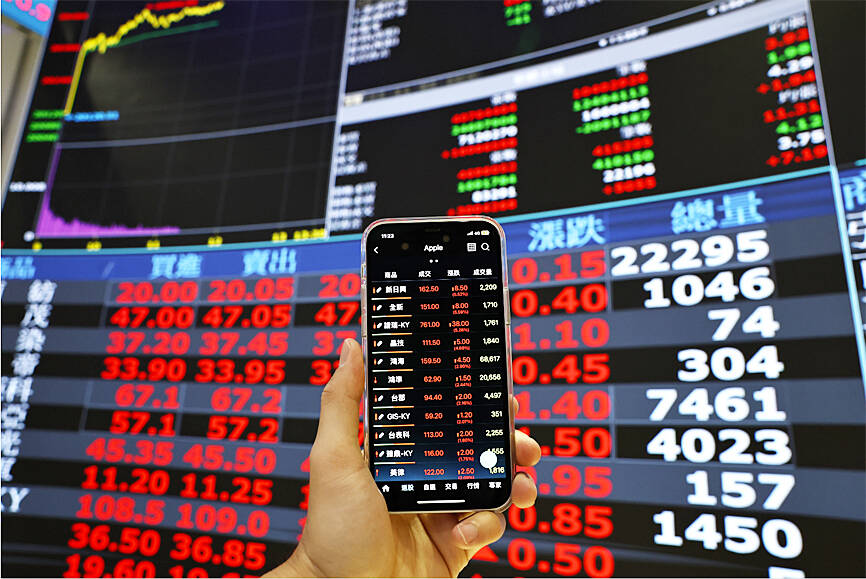The consumer confidence index this month declined by 10.14 points to a five-year low of 63.37, dragged mainly by drastic corrections on the local bourse, a report released yesterday by National Central University showed.
It was the steepest fall in history and reversed six straight months of upturn, said Dachrahn Wu (吳大任), director of the university’s Research Center for Taiwan Economic Development, which conducted the monthly survey.
The April 3 earthquake, which measured magnitude 7.2 on the Richter scale, and ensuing aftershocks are also to blame, even though the six subindices lost points, Wu added.

Photo: CNA
Confidence values of 100 and higher suggest optimism and points lower than the neutral threshold indicate pessimism.
The reading on stock investment was 24.65, falling an unprecedented 38.76 points from one month earlier, as the TAIEX tumbled more than 1,000 points during the survey period between April 18 and April 21, Wu said.
The TAIEX dropped 3.81 percent on April 19, one day after chipmaker Taiwan Semiconductor Manufacturing Co (TSMC, 台積電) painted a lukewarm picture for global chip demand for the rest of this year.
Foreign institutional players slashed holdings of local shares by NT$704.79 billion net, which saw the local currency fall to an eight-year low.
There is no need to assign excessive importance to the investment confidence measure, which is volatile and susceptible to political and economic shocks at home and abroad, Wu said.
The TAIEX yesterday reclaimed recent highs, thanks to a spillover effect linked to robust earnings by US technology giants.
The job market subindex fell 5.69 points to 64.72, while the gauge on future household income levels softened 4.85 points to 74.65, the survey showed.
Safety concerns and the many aftershocks would dampen interest in domestic tourism, especially in mountainous areas, which would take a toll on job opportunities in hospitality sectors, Wu said.
Several lodging facilities in Hualien County have temporarily suspended operations, with a few exiting the market for good.
Wu said he is personally skeptical that private consumption would be strong this year after two straight years of rapid expansion.
Public confidence in the nation’s economy for the next six months dropped 4.08 points to 79.6, as geopolitical tensions heighten and the US Federal Reserve could reconsider interest rate cuts amid stubborn inflation, the report said.
Meanwhile, the subindex on consumption of durable goods declined 4.04 points to 107.8, staying in healthy territory, the report showed.
The April 3 earthquake would have significant influence on house prices, as prices of apartments built with better temblor resistance would increase, Wu said.
People also remain discontent about retail prices, with the gauge seeing a reduction of 3.47 points to 28.78.

Sweeping policy changes under US Secretary of Health and Human Services Robert F. Kennedy Jr are having a chilling effect on vaccine makers as anti-vaccine rhetoric has turned into concrete changes in inoculation schedules and recommendations, investors and executives said. The administration of US President Donald Trump has in the past year upended vaccine recommendations, with the country last month ending its longstanding guidance that all children receive inoculations against flu, hepatitis A and other diseases. The unprecedented changes have led to diminished vaccine usage, hurt the investment case for some biotechs, and created a drag that would likely dent revenues and

Global semiconductor stocks advanced yesterday, as comments by Nvidia Corp chief executive officer Jensen Huang (黃仁勳) at Davos, Switzerland, helped reinforce investor enthusiasm for artificial intelligence (AI). Samsung Electronics Co gained as much as 5 percent to an all-time high, helping drive South Korea’s benchmark KOSPI above 5,000 for the first time. That came after the Philadelphia Semiconductor Index rose more than 3 percent to a fresh record on Wednesday, with a boost from Nvidia. The gains came amid broad risk-on trade after US President Donald Trump withdrew his threat of tariffs on some European nations over backing for Greenland. Huang further

CULPRITS: Factors that affected the slip included falling global crude oil prices, wait-and-see consumer attitudes due to US tariffs and a different Lunar New Year holiday schedule Taiwan’s retail sales ended a nine-year growth streak last year, slipping 0.2 percent from a year earlier as uncertainty over US tariff policies affected demand for durable goods, data released on Friday by the Ministry of Economic Affairs showed. Last year’s retail sales totaled NT$4.84 trillion (US$153.27 billion), down about NT$9.5 billion, or 0.2 percent, from 2024. Despite the decline, the figure was still the second-highest annual sales total on record. Ministry statistics department deputy head Chen Yu-fang (陳玉芳) said sales of cars, motorcycles and related products, which accounted for 17.4 percent of total retail rales last year, fell NT$68.1 billion, or

MediaTek Inc (聯發科) shares yesterday notched their best two-day rally on record, as investors flock to the Taiwanese chip designer on excitement over its tie-up with Google. The Taipei-listed stock jumped 8.59 percent, capping a two-session surge of 19 percent and closing at a fresh all-time high of NT$1,770. That extended a two-month rally on growing awareness of MediaTek’s work on Google’s tensor processing units (TPUs), which are chips used in artificial intelligence (AI) applications. It also highlights how fund managers faced with single-stock limits on their holding of market titan Taiwan Semiconductor Manufacturing Co (TSMC, 台積電) are diversifying into other AI-related firms.